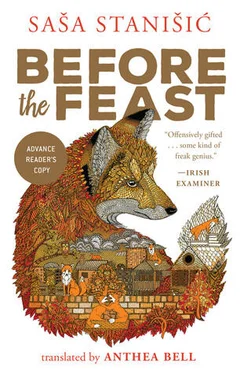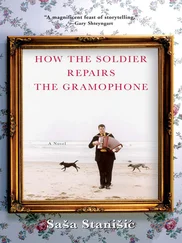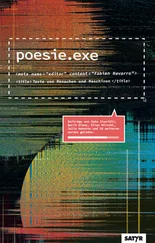On the roads: the huntresses. Frau Schwermuth. The vixen.
By night: music and eternity, how shall we ever find peace?
AT 16 THÄLMANN-STRASSE BY NIGHT: MUSIC. Dietmar Dietz, known as Ditzsche, lives there. Unmarried, always behaves decently to children and animals, a postman before reunification, keeps fifteen pedigree chickens today.
Ditzsche arrived in Fürstenfelde during the Extended Countryside Children’s Evacuation scheme, and was never collected. His family here, the Gracedieus, were descended from Huguenots; they weren’t bad people. Family is family; better any kind of family than none. The Gracedieus kept themselves to themselves, went on a trip to Cuba every year, took Ditzsche with them once. There was talk: how could they afford it? They died in a plane crash at the end of the 1970s. An end like that somehow doesn’t belong in Fürstenfelde, but okay.
A table stands outside the gate to the inner courtyard of the building at Number 16, with a pink plastic box on it. The box is always out there, come rain, come ice, come night. The box contains eggs: ten for two euros. It’s a fair price. Ditzsche has good chickens, healthy and well looked after, given special food and the devotion of an outsider. Chickens who smell like proper chickens. They warn Ditzsche of the arrival of a storm or a stranger. They keep quiet when the postman calls.
Every few days Ditzsche takes any unsold eggs out of the box and carefully fills it with fresh ones. This is one of the rare moments when you can see him outside. The face of Dietmar Dietz is as pink as his plastic box. Wrinkled, a wrinkled face. Sinewy arms and legs. Ditzsche’s shirts are too big for Ditzsche in his old age. They weren’t always too big. His shirts used to fit him, and were ironed. His blue-gray uniform suited him perfectly, which is remarkable when you think how rarely GDR uniforms suited anyone at all perfectly.
In ’95, when city folk rediscovered our lakes, the village wanted to print new postcards for the holiday bathing season. The Creative Committee met in the Homeland House to discuss what pictures to have on the postcards. As well as the Homeland House itself and the lakes, of course. There were to be four designs. The third was a horse outside the old town wall, so that killed two local sights with one stone. When we came to the fourth local sight we’d run out of ideas. We thought briefly of giving the church a renaissance, but the majority were against it. And then the ferryman suggested printing a picture of Ditzsche’s egg box on the postcard.
What a fuss we kicked up.
Ditzsche was a loner, some said, and a loner isn’t a good advertisement for family holidays. And Ditzsche had been in the Stasi, and thinking of the Stasi puts people off wanting to enjoy social activities. And so on, and so forth, Ditzsche this, Ditzsche that.
But then the ferryman said, “Friends: ten eggs for two marks. That’s a fair price, you won’t get fairer. And you all buy them. On the quiet, but you buy them. And it’s not as if we were going to show Ditzsche on the postcard, just his egg box. The egg box doesn’t have a past history in the Stasi. All of us here know it. It shows that if you make the wrong decisions, if you lose your job and you’re poor and everyone hates you because they all think you were an informer, and you’re too stupid to deny it, it shows, like I say, that if life really kicks your arse so hard that you fall flat on your face, and you have diabetes into the bargain, right, well, all that doesn’t necessarily keep you from selling very good eggs at a fair price.”
The Creative Committee fell silent.
And when its silence was over, we voted on the egg box, but it still wasn’t decisive, three against three. So we asked the photographer for her opinion. That was Frau Kranz, because if you can paint you can also take photographs. She didn’t hesitate long: “Yes, well, the egg box will do, in fact it’s almost original somehow, a colorful, idyllic countryside theme in this bloody dismal road, the egg box is okay.”
That was a little harsh of her, but Frau Kranz is like that. Every two years since then, on account of inflation, there’s been a new postcard showing the egg box left out by Dietmar Dietz, known as Ditzsche, twice orphaned, the loner, the postman who is still suspected to this day of snooping around looking at people’s post, the diabetic whose shirts don’t fit him any more, but he has no money or maybe no inclination to buy new shirts, because his chickens don’t care about shirts and every day could be his last. But Ditzsche wakes up and gets on with life, and we bet everyone will come to his funeral, the egg box will come too, and most of us will really wear mourning, and the egg box will end up in the Homeland House with the rest of the GDR junk, ten eggs: two euros, with the best will in the world you won’t find a fairer price. Recently Ditzsche has hung a friendly-looking plastic hen from the box, by way of decoration.
Sometimes, when you take ten large Uckermark eggs out of the box and leave two euros, or sometimes two euros twenty cents, you can hear the chickens cackling in the yard. If you come to buy eggs at night, you hear music inside the building. It’s like that tonight. Tonight there’s music in Ditzsche’s apartment, and there are shadowy figures behind the curtains, and the soles of shoes moving over the floorboards. Or maybe it’s just the curtains moving. Or nothing moves at all. The music is tango or salsa or merengue, here we’re not so sure exactly what.
THE VIXEN RUNS STRAIGHT ALONG BESIDE THE water. She picks up the scent of an old female human in the water, one she has sometimes met in the old forest. This human animal can stay peacefully in one place for a long time. Humans don’t often act that way. Usually this female’s scent is mingled with other fine aromas that the vixen likes to taste: dyer’s woad, umber and cinnabar and resin. Now she also picks up the sharp sweetness of fermented fruits, the potassium and manganese of tears. Good. Danger doesn’t smell of tears.
The vixen, going farther, soon comes upon a second female human, a large specimen. Close to the place where humans put their dead into the earth, she is walking round three objects on the bank, humming quiet, angry human sounds. The vixen is curious; what’s here? The female human smells of carrots, the objects — three dome-like things — have a scent of tin and copper and a third something that attracts the vixen.
The female human sounds as if she wants to have a fight with the domes, but the domes don’t do anything. The vixen waits. After a while the female goes away. The vixen circles the domes as the female human did, scenting them. Under the metal she scents ways she has already gone. Prey she has killed. Food stolen from containers that were easy to bite through. She scents the fast dog fox whom she lured to her and tricked in the cold time, and who bit the back of her neck and helped her to feed her cubs at first. She let him think that he had tricked her, and it wasn’t her own game and what she wanted.
It’s all there. All the aromas she has ever scented. Including her sister’s last flight and the dogs that she disturbed. The humans’ dogs came so close to the vixen that she could scent their muzzles; they tasted of their masters’ caressing fingers. The vixen fled here to the human colony instead of deeper into the undergrowth. The dangerous humans and dogs were in the forest, they wouldn’t be able to protect their own earths at the same time. She is still alive, her sister isn’t.
Every scent under the domes belongs to a Before. In all of them together, the vixen scents her own survival. It calls her, she wants to free it, she wants to have it for its own sake, she begins digging, wants to get under the domes. The vixen yelps, pants, alarmed and encouraged because under the domes and in the survival there’s a scent that makes her think: me.
Читать дальше












